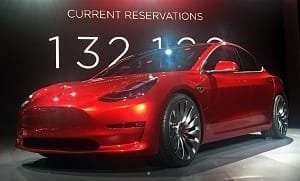Tesla’s Model 3 electric car has been making waves since it launched just last week. It’s being whispered in many circles that the Model 3 could have as great an impact as the very first Ford Model T which was introduced into the marketplace 110 years ago. Ford’s Model T held the record for being the world’s highest-volume production car for many years until the Volkswagon Beetle passed it in 1972.
Comparing the Model 3 to the Model T is rather bold considering that Tesla have some creases to still iron out regarding production and delivery of the vehicle. Here’s what you should know about Tesla’s Model 3: 1. The production of the Model 3 is set to begin by the end of next year – leaving a short 18 months for Tesla to ready themselves. Chief executive Elon Musk hopes to be producing 500 000 vehicles annually once production is in full swing. The factory in Fremont, California, has the capacity to deliver on this goal but the Nevada “Giga factory” won’t be completely operational until 2020 which is leaving many concerned that this might turn into yet another one of Tesla’s “over-promise, under-deliver” situations. 2. The Model 3 design must still be completed and various tests and certifications need to be conducted by different global regulators before the vehicle can officially hit production. 3. Financial analysts have expressed concern that Tesla will need additional equipment finance or capital if it wants to boost the production of the Model 3, or they might end up with back-dated post-debut orders. They can make use of the additional space at the facility in Fremont but they will need more tools and equipment.4. The basic entry-level Model 3 will have a starting cost of $35 000 (R529 376.75).
5. Once it has been fully charged the vehicle will drive approximately 346km. 6. There’s nothing “high-end” about this vehicle. Unlike what Tesla offered with their earlier models (the Model S and Model X), this time around Tesla is offering an unfussy vehicle that won’t break the bank. The lesson was quickly learnt when the company launched the Model X fully loaded “signature” series that offered all the bells and whistles you could think of but that was set at an exorbitant starting price. In this BBC article they ask the question, “are electric cars ready to go mainstream?” And after an interview with Musk, it appears there are two pertinent issues that must be resolved for electric vehicles to become completely mainstream and eventually used within a commercial capacity. Firstly, the cost of the vehicle itself must be affordable or only a very few number of people will actually benefit and secondly, the infrastructure for charging the vehicles en masse must be built for convenience. Green consumerism is on the rise and vehicle manufacturers that take into account their impact on the environment (think Volkswagon Blue Motion Technology) have turned a profit from their efforts. If Tesla is able to get the price right, offer a robust vehicle that will last and refine the production of their vehicles then they are set to make a massive impact on the industry.






